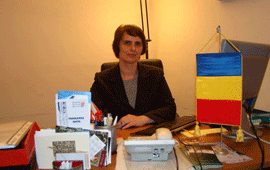> [Archived] Interviews

The 'Dimitrie Cantemir' Balkanic Music Festival in Venice
The 'Dimitrie Cantemir' Balkanic Music Festival is taking place in Venice between February 10th and 13th, at the same time as the traditional Venetian Carnival; the festival will host the performances of four ensembles with significant contributions with respect to the Romanian Prince's musical works. To find out more about the guest ensembles and about the overall involvement of the Romanian Culture and Humanistic Research Institute in Venice (IRCCU) and that of the La Fenice Theatre in the materialisation of this project, we have spoken to Ms. Monica Manuela JoiĢa, deputy director of IRCCU in Venice.
The 'Dimitrie Cantemir' Balkanic Music Festival in Venice is considered to be an integrated part of the Carnival in Venice. Which are its reference points?
Firstly, I must say that this is not the first time the Romanian Culture and Humanistic Research Institute in Venice has organised Romania's participation in the Carnival of Venice. I would like to remind you that in 2008 we managed to obtain the status of honoured guest country for Romania at the year's edition of the carnival, so I believe we do have the experience and expertise to organise a grand event once more, with great success among the public, especially as this edition of the carnival marks another debut for Romania: the institute in Venice has organised for Romania to take part in the International Children's Carnival, coordinated by the Biennial Art Foundation in Venice. However, getting back to the festival you have mentioned, it will consist of a series of four concerts. Of course, this general label of Balkanic music might be a little surprising, because the concept of the Balkans has possibly got a negative connotation here, in Italy, as well, but what we have aimed to emphasize with these concerts, hopefully in a successful manner, is precisely the cultural richness of Balkanic traditions. We have found it eloquent in that respect that the name of Dimitrie Cantemir should have resurged so strongly in European musicology, in connection to The Book of Music Science that the Romanian prince wrote during his stay in Constantinople. This great figure of our culture lends his name to the Balkanic Music Festival and, moreover, is the thread that connects the performances of the four ensembles. Thus, the programmes of all four ensembles will include reinterpretations of pieces from Cantemir's Book of Music Science as a main focus.
The concerts performed by Jordi Savall and Hesperion XXI are definitely a great highlight of the festival. However, please tell us more about the other ensembles invited to the festival. How was your collaboration with them?
The collaboration with all four ensembles was excellent in all respects. Of course, we were most glad for the interest shown by the management and staff of the La Fenice Theatre in our proposal. I would say that it is an honour for us to collaborate with such a prestigious theatre, this being actually the third time we have collaborated with them.
To get back to our guests, we have naturally though of Jordi Savall, for he has been a
long-term collaborator of the Romanian Cultural Institute; you certainly recall the concert he held on the stage of the Romanian Athenaeum on December 7th 2011 - the programme of the concert in Venice will be roughly the same. We thought that Jordi Savall deserves official recognition for his diligent efforts to make known the traditions of the authentic music found in our part of Europe; consequently, at the initiative of our institute, tomorrow night's concert will begin with Jordi Savall's being decorated with the distinction conferred upon him by the president of Romania.
As to the other three ensembles, one of them is the BezmÓrÓ Ensemble in Turkey, founded in 1996 with the actual purpose of reinterpreting certain pieces, mostly instrumental ones, from Cantemir's Book of Music Science ; then there is an ensemble that is unfortunately less known in Romania, perhaps even not at all. We only discovered it last year - the MaragÓ Ensemble, founded here, in Venice, not so long ago, in 2008. We have had the pleasure of receiving a visit from this ensemble's leader last year and that is how we became aware of its commendable activity, an ensemble from our very city which is very familiar with Cantemir's Book of Music Science and therefore the La Fenice programme will comprise these pieces as its focal points.
Last, but not least we have the Anton Pann ensemble, well known to the Romanian audience. The Anton Pann ensemble will make a meaningful closing of the Balkanic Music Festival and, of course, our collaboration with this group went excellently as well.
We hope that this intertwining between the, let's say Spanish Sephardic style of Jordi Savall, the Venetian performing style of the MaragÓ Ensemble, the Turkish-Ottoman style of the BezmÓrÓ Ensemble and the Romanian style of the Anton Pann Ensemble taking place on the stage of the La Fenice Theatre echoes strongly into the hearts and minds of the audience filling its halls, as we have especially chosen this moment of the carnival when the audience is formed not only of Venetians, but also of tourists who wish to attend Venice's most famous event; thus, this diverse audience, coming from many parts of the world will come together and hopefully take home some extraordinary cultural impressions from the Balkanic Music Festival.
Translated by Roxana-Andreea Dragu
TTLC, Bucharest University














